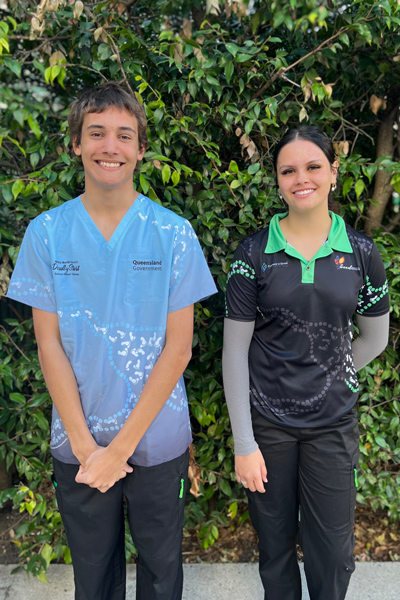
Kobi and Mikhalia are two of our new Deadly Start trainees
Deadly Start expands across the state to welcome 139 trainees
Metro North Health will today welcome a record 139 Aboriginal and Torres Strait Islander students into the Deadly Start program as it expands across the State.
Celebrating its fifth year since the program began, the school-based trainee program facilitates healthcare career pathways for high school students with a direct focus on First Nations patient care.
Students will now spend one day a week employed at a number of Queensland hospitals as part of the expanded model which now boasts 12 ‘hubs’ managed by Connect ‘n’ Grow in locations from Cairns to the Gold Coast.
The hospitals include Royal Brisbane and Women’s Hospital, The Prince Charles Hospital, STARS, Redcliffe Hospital, Caboolture Hospital, Princess Alexandra Hospital, Ipswich Hospital, Queen Elizabeth II Hospital, Rockhampton Hospital, Mt Isa Hospital, Sunshine Coast University Hospital, Gold Coast University, Bundaberg Hospital, Mt Morgan Hospital, Mackay Hospital, Townsville Hospital and Cairns Hospital.
Metro North Health has been running its Deadly Start program since 2019, employing a significant number of students in nursing, midwifery and other health careers each year as they have successfully completed the program.
Deadly Start Trainee Mikhalia Saltner said she’s excited for her one day a week as an Assistant in Nursing, which will set her up for a future in paramedicine.
“I’ve wanted to a paramedic since I was little, so I just thought this was a great opportunity,” she said.
“I love the idea of doing nursing or paramedicine because you never know what’s going to happen, it’s so unexpected and I love that.”
For her fellow trainee Kobi Williams, he’s excited to scope out the various health careers available to him while in his traineeship.
“I’ll be working as an Assistant in Nursing in the orthopaedic ward at the Royal Brisbane and Women’s Hospital where I’ll look after people post-surgery,” he said.
“This is a traineeship that turns into employment, so my plan is definitely to pursue a career in health and if that means going to university after to get a qualification, I’ll do that.
“I don’t have a specific area of health I want to go into yet but I’m excited to see a lot of different points of view in the traineeship and then I can work out what I want to do.”
